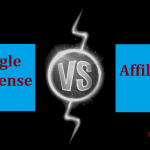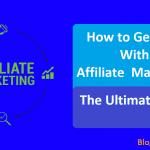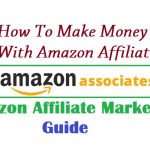Dear marketers, passionate bloggers, and those of you who want to become one of those — welcome! There are different opinions and fierce debates going on daily on the topic:
Which one is better — PPC monetization or affiliate marketing?
The information can be overwhelming, so we’ve decided to resolve this dilemma once and for all!
In order to answer the question from the title and recommend a successful monetization strategy, let’s start with explaining the basic concepts and their major principles.
Contents In Page
What Is PPC Monetization?
Pay per click (PPC) is a marketing strategy set up by search engines and various advertising networks.
This strategy allows for ads targeted by keywords or general theme ads to be placed in the appropriate place on our website. The advertiser then pays for each click made on the ad, and we get a certain percentage of what they pay.
This is currently the most popular way to monetize a website. However, PPC is certainly not the only way to offer advertising space on our site. Nevertheless, to keep things simple, we will focus solely on it.
Various platforms deal with website monetization, and we can dive deeper into the technical conditions they offer. But they all function in the same way. The most popular is certainly Google AdSense, which is why we’ll be sticking to it in this article.
What Is Affiliate Marketing?
Affiliate marketing includes all elements of a full marketing strategy. We can even say that this is an advanced version of a marketing agency.
To be able to explain what affiliate marketing is all about, let’s look at one very specific example.
Let’s say that we own a website. It’s a blog about interior design that gets a fair amount of traffic. We’ve found an online shop that sells apartment accessories.
So to use some of their products in our post, we can write an article on the topic “How to make your living room look like a million dollars.”
In it, we can describe five lamps sold by the online shop. We can then include high-quality product pictures and provided specific recommendations.
For example, we can advise the readers on how to position the lamps, how to combine them with other pieces of furniture, etc.
Finally, we can add the purchase links for each lamp below the text. For every lamp purchase that comes from our site, we now get an agreed sales percentage.
This is affiliate marketing, and it can be compared to a marketing agency, as we are the ones designing a marketing strategy to sell the product. Moreover, we can, and should, take different marketing actions to make a sale — write content, optimize it, promote it.
Now that you know what affiliate marketing is, you should know that most sites that sell something online have their own affiliate programs. It’s up to us to find those that are related to our niche.
What Will Generate More Revenue: PPC or Affiliate Marketing?
Since we’ve explained the basics of both PPC and affiliate marketing strategies, let’s see which one is more effective.
As we said, PPC is an advertising strategy where we earn from every click on the ads placed on our website. Moreover, we also get compensated for every 1,000 ad impressions.
However, even though Google shares the percentage we earn from clicks, there is no formula available to show us the actual earnings per click. One day it can be $3, and the next day $1.
With affiliate marketing, we also won’t be able to know exactly how much we will earn each day. Nevertheless, we will know exactly how much we will earn from each sale. Ours is only to make sure to generate as many sales we can.
Affiliate marketing commission can be expressed as a percentage or as an absolute amount. To use the example with the lamps, let’s see what we will earn if our commission is 20%.
If the price of a lamp is $100, we will get $20 for every lamp sold. Let’s say our article manages to generate 50 sales in one month. This means that we will earn $1,000 from this one article only.
Although the figures in this text are arbitrary, they serve well to make a point — the earning potential is very tempting.
What Will Generate Revenue Faster: PPC Ads or Affiliate Marketing?
The prevailing opinion is that PPC will help us monetize our website more quickly. At first glance, this might make sense. However, both PPC’s and affiliate marketing’s monetization success will depend on the amount of traffic our website gets.
It is true that it’s easier to get an ad click than to get a sale. If you are a beginner in advertising and marketing in general, the PPC strategy will probably be more attractive to you. However, the revenue opportunities are pretty much on the side of affiliate marketing.
You are probably aware that building, maintaining and promoting a website takes a lot of time, knowledge and effort. So if you’re already putting in all that effort and seeing some success, make sure your monetization efforts are really profitable. Affiliate marketing programs can certainly help you achieve this.
What Are the Benefits of an Affiliate Program?
The first thing you should know is that, with affiliate programs, we can directly influence and develop our marketing strategy.
The earnings are pretty much in our own hands; the only question is whether we are capable enough to capture them.
Second, the products we choose to advertise are usually closely related to our own area of interest and expertise.
This means we can position ourselves as an authority and get the trust of potential buyers. If we season all of this with a couple of proven sales techniques, we are already on a good path to becoming a very successful seller in our niche.
Next, each of our articles is like a sales page that can keep generating revenue even without us putting in additional effort.
Of course, we’ll have to make sure we do everything right — that the article is well-written and properly organized, that we’ve applied the above-mentioned sales techniques, etc.
Finally, affiliate programs allow us to be independent and creative. There are no specific guidelines and conditions that our sales campaigns must meet.
The website that sells the product won’t restrict us in any way. This means we will be able to organize our marketing campaigns independently and promote the product in any way we find appropriate.
With all these benefits, we can conclude that the future of website monetization relies on affiliate marketing.
So keep up with trends and stay ahead of others.
Join the strategy that gives you freedom, creativity and a chance to generate a really good income.




![What Is Affiliate Marketing and How to Make Money From It [Method] Affiliate Marketing Gude How To Make Money](https://www.blogbeginner.com/wp-content/uploads/2019/03/Affiliate-Marketing-Gude-How-To-Make-Money-150x150.jpg)
![CPA vs Affiliate Marketing: How to Make Huge Money With CPA [Method] cpa vs affiliate marketing](https://www.blogbeginner.com/wp-content/uploads/2019/03/cpa-vs-affiliate-marketing-150x150.jpg)


